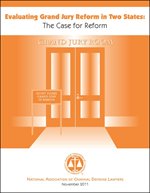Grand Jury
Rather than a bulwark against "hasty, malicious and oppressive prosecution," today's federal grand jury is too often a rubber stamp, leading many to agree that "a good prosecutor could get a grand jury to indict a ham sandwich."
NACDL calls upon Congress to halt the dangerous erosion and abuse of the federal grand jury and enact the modest proposals outlined in our Federal Grand Jury Reform Report & "Bill of Rights."
Among the critical, workable reforms detailed in that report are:
(1) the right to counsel for grand jury witnesses who are not receiving immunity;
(2) an obligation to present evidence which may exonerate the target or subject of the offense; and
(3) the right for targets or subjects to testify.
- Reform Proposals
- Reform Report and Bills of Rights (2000)
- New Mexico Court Imposes Pre-Indictment Mechanism that Enables Investigation Targets to Alert Grand Jury to Exculpatory Evidence (January 2009)
Webinar - Reexamining the Grand Jury: Prosecutors, Police, and Race
The grand jury has long drawn criticism for failing to serve its purpose as a shield against unwarranted charges. Recently a new charge has been leveled: that prosecutorial influence over the grand jury permits law enforcement misconduct to go unpunished. Both facets of the issue will be discussed in turn by two distinguished panels of experts. The first panel addressed Due Process & the Grand Jury: Protecting Targets and Witnesses and the second panel examined Equal Justice & the Grand Jury: Achieving Racial Fairness.
Report - Evaluating Grand Jury Reform in Two States: The Case of Reform
 NACDL issued a groundbreaking new report on restoring and reforming the grand jury system-- Evaluating Grand Jury Reform in Two States: The Case for Reform. This research reflects an in-depth study of grand jury reform in two states – New York and Colorado. In conducting this study, researchers Erin Crites, Jon Gould and Colleen Shepard of the Center for Justice, Law & Society at George Mason University studied the experiences of prosecutors, defense lawyers and retired judges. Four key reform recommendations emerge from the research: (i) defense representation in the grand jury room, (ii) production of witness transcripts for the defense, (iii) advance notice for witnesses to appear, and (iv) the presentation of exculpatory evidence to the grand jury.
NACDL issued a groundbreaking new report on restoring and reforming the grand jury system-- Evaluating Grand Jury Reform in Two States: The Case for Reform. This research reflects an in-depth study of grand jury reform in two states – New York and Colorado. In conducting this study, researchers Erin Crites, Jon Gould and Colleen Shepard of the Center for Justice, Law & Society at George Mason University studied the experiences of prosecutors, defense lawyers and retired judges. Four key reform recommendations emerge from the research: (i) defense representation in the grand jury room, (ii) production of witness transcripts for the defense, (iii) advance notice for witnesses to appear, and (iv) the presentation of exculpatory evidence to the grand jury.







